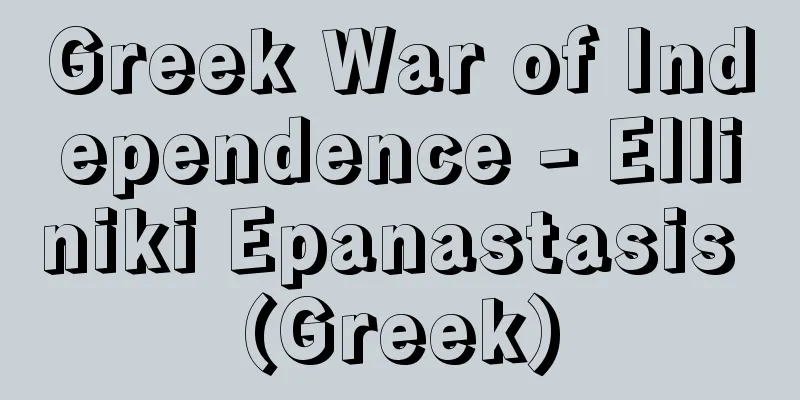Greek War of Independence - Elliniki Epanastasis (Greek)

|
A war (1821-1829) that gave independence to Greece from the control of the Ottoman Empire. The nationalistic Greek independence movement was prepared under the strong influence of the French Revolution by Greek intellectuals such as Adamantios Korais (1748-1833) and Konstantinos Rigas (1757-1798) who were scattered across Europe in the 18th century, but in 1814 a secret society called the Filiki Eteria (Society of Friends) was formed in Odessa with the goal of armed uprising. The president of the Society, Alexander Ypsilandis, rose up in Moldavia and Wallachia on February 22, 1821 (lunar calendar), but on the Greek mainland, the Spartan-Messenian Legion occupied Kalamata on March 23 of the same year (lunar calendar), and the flames of the rebellion gradually spread from the Peloponnese to central Greece. While the Turkish army was busy hunting down the rebel Ali Pasha, the war situation was favorable for the rebels, but Dimitrios, the brother of the president of the Society, was unable to maintain his supremacy due to resistance from the Peloponnesian Elders, and the first National Assembly convened in December of the same year drew up a provisional constitution but was unable to overcome regional sectionalism, leading to a civil war in 1824. From 1825, the Egyptian army led by Ibrahim Pasha began a full-scale reconquest of Greece. In the midst of this military crisis, the Troezen National Assembly, held in 1827, called for active intervention by the great powers, and elected Kapodistrias, an internationalist with superior diplomatic skills, as president. Britain, Russia, and France, who had consolidated their joint intervention through the Protocol of London, sent a fleet to support Greece, and destroyed the joint Turkish-Egyptian fleet in the Battle of Navarino in October of the same year. As a result, Greece was effectively liberated from Turkish rule, and its independence was internationally recognized by the Protocol of London in March 1829. [Keiji Baba] Source: Shogakukan Encyclopedia Nipponica About Encyclopedia Nipponica Information | Legend |
|
オスマン・トルコ帝国支配下のギリシアを独立させた戦争(1821~1829)。民族主義的なギリシアの独立運動は、18世紀のヨーロッパに散住したコライスAdamantios Korais(1748―1833)やリガスKonstantinos Rigas(1757―1798)などのギリシア知識人により、フランス革命の強い影響の下に準備されたが、武装蜂起(ほうき)を目的とする秘密結社「フィリキ・エテリア(友愛会)」が1814年にオデッサで結成された。同結社の総裁アレクサンドロス・イプシランディスは1821年2月22日(旧暦)モルダビア、ワラキア方面で決起したが、ギリシア本土では同年3月23日(旧暦)「スパルタ・メッセニア軍団」がカラマタを占領して、反乱の火の手はペロポネソス半島から中部ギリシアへしだいに拡大した。トルコ軍が謀反者アリ・パシャ追討に忙殺されている間は、反乱軍に戦況が有利であったが、友愛会総裁の弟ディミトリオスは、ペロポネソス長老会の抵抗にあって統帥権を貫けず、また同年12月招集の第1回国民会議は、暫定憲法を制定したものの地方割拠主義を克服することができず、1824年には内戦にまで発展した。1825年からはイブラヒム・パシャの率いるエジプト軍が本格的なギリシア再征服に乗り出した。この軍事的危機のなかで、1827年に開催されたトロイゼン国民会議は、列強の積極的干渉を求め、外交手腕に勝る国際人のカポディストリアスを大統領に選出した。ロンドン議定書によって共同干渉の体制を固めたイギリス、ロシア、フランスは、ギリシア支援の船隊を送って、同年10月ナバリノの海戦でトルコ・エジプト連合船隊を撃滅した。これによって、ギリシアはトルコ支配から事実上解放され、1829年3月のロンドン議定書によって、その独立が国際的に承認された。 [馬場恵二] 出典 小学館 日本大百科全書(ニッポニカ)日本大百科全書(ニッポニカ)について 情報 | 凡例 |
Recommend
Tongue fern
...The rhizome is long and creeping, about 3 mm i...
Topological invariant - Topological invariant
...The term analysis situs was in use for a long ...
Waki-noh - Waki-noh
A type of Noh. It is a celebratory piece that is ...
Hiroichiro Maeda
Born: November 13, 1888 in Sendai, Miyagi [Died] D...
Kalmar Union - Kalmar Union
The union of Denmark, Sweden, and Norway was forme...
Lemche, G. (English spelling) LemcheG
...Leader Jorgensen soon converted to Catholicism...
Yodoya Tatsugoro
Date of birth and death unknown. A wealthy mercha...
Trapa natans (English spelling) Trapanatans
…[Kaoru Ichijo]. . . *Some of the terminology exp...
Barium Chloride - Encabarium
BaCl 2 (208.24). When barium carbonate is dissolv...
Ryomo Line
The name of the East Japan Railway Company's ...
Katsura School - Katsura
〘Noun〙 A school of metalwork. Its founder was Kats...
Murata Gun - Murataju
This rifle was designed by Major General Murata T...
Fundamental matrix
...Therefore, if we use Φ( t ) to represent the m...
Stepanov, VI (English spelling)
...After that, various dance notation methods wer...
Waterfront Railway
A railway line built to transport goods in coastal...









